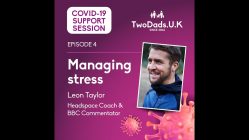We wanted to know more about reverse vasectomies and asked the wonderful Dr Michalis Kyriakidis, MD, M.Sc., Assisted Reproductive Gynaecologist from Embryolab Fertility Clinic to talk us through what a vasectomy is and reversing the process for a man to become fertile again. Here Dr Michalis answers all.
Q: What is a vasectomy?
A: Vasectomy is a form of male contraception. The basic principle of vasectomy is the discontinuation of ducts that carry the sperm from the testis to the ejaculate. To this day, it remains one of the most reliable forms of contraception and more than 40 million men worldwide rely on it. And although it is highly effective, sometimes problems arise due to insufficient patient information. The procedure should be considered irreversible, so men should be very cautious before choosing it. If not sure, then alternative forms of contraception should be considered.
Q: What is a reverse vasectomy?
A: When a man has not completed his family, then a reversal of the previous vasectomy is needed. Basically, this is a procedure where the doctor re-connects the ducts that carry the sperm to the ejaculate. This is called an anastomosis and it is a micro-surgical technique with minimal complications. However, it is not always successful.
Q: How soon after a reversal is a man fertile again?
A: In theory, sperm should be identified in the ejaculate one month after the vasectomy reversal. Unfortunately, subsequent fertility is not guaranteed. Studies have shown that success rates of vasectomy reversal are dependent on the duration of occlusion, intraoperative semen fluid quality and selection of operative technique.
Q: Is it likely to result in successful pregnancy or is the sperm damaged?
A: There is always the chance of a natural conception after vasectomy reversal. Still, experience has shown that the sperm sample is altered after a vasectomy. One of the most important factors that play a role is duration of vasectomy. If reversal is performed within 3 years from vasectomy then patency rates of the tubes as well as natural conception rates remain high. This decreases gradually with increasing duration to a point where if vasectomy duration is more than 15 years, natural conception rates are low.
Q: Can the sperm quality improve over the years?
A: Sperm production is a dynamic process. As a result, it is not uncommon to see variations of the sperm quality even in men without a history of vasectomy-reversal. Our experience in Embryolab has taught us that improvements can happen in the first few years after the reversal. If this does not happen, then Assisted Techniques are a reliable solution.
Q: Is it true that men have antibodies on their sperm after a vasectomy? What are these antibodies? (What does it mean to have antibodies?)
A: The antigenic properties of human sperm were reported as early as the end of 19th century. Indeed, anti-sperm antibodies generally develop as a result of an accidental or iatrogenic breach of the blood–testis barrier or from obstruction of the male reproductive tract. Most men with a vasectomy will develop these antibodies. Sperm Antibodies are believed to have an adverse impact on male fertility by influencing sperm quality and sometimes function. It has been shown that anti-sperm antibodies reduce sperm concentration and motility but they do not influence morphology of the sperm.
Q: Why do sperm sample results differ?… we had one that was over 50% antibodies ( 89%) and then another that showed as less than 50%. This made the clinic think they had actually gone! Unlucky for us, they had not.
A: This variation of antibody levels can be the result of differences of the tests used to detect them. Some labs use different assays than others. Moreover, there are three different types of antibodies and not all of them can play a role in natural conception. Given that expression of a certain antibody displays fluctuation, it is not uncommon for the results to differ as well.
Q: Can antibodies completely go?
A: Unfortunately, the answer is no. As soon as sensitization happens, immune memory starts to exist. As a result, a man’s body can at any time produce these antibodies.
Q: Does keeping the scrotum ice cold with an ice pack help with the quality?
A: No, the scrotum should not be exposed to extreme temperatures. There are other ways to improve quality of the sperm.
Q: Do you recommend taking supplements?
A: Yes, a change of lifestyle can have surprising results on sperm quality. Supplements such as antioxidants and multivitamins can be very beneficial. Moreover, exercise, a healthy diet and smoking cessation will significantly improve the quality of the sperm.

Q: Is it best to have the ICSI treatment after a reverse vasectomy or sperm extraction?
A: ICSI remains the most valuable and reliable treatment after vasectomy reversal and high levels of sperm antibodies. Unfortunately, if reconnection of the tubes is not performed then sperm extraction is needed. This is usually done with a fine-needle testicular aspiration, a relatively minor operation with minimal complications. Assisted Reproductive Technology remains to this day the best solution to the problem of unsuccessful vasectomy reversal.
To contact Dr Michalis Kyriakidis for this and further fertility queries, click here
Or email Dr Michalis Kyriakidis, MD, M.Sc on [email protected]








